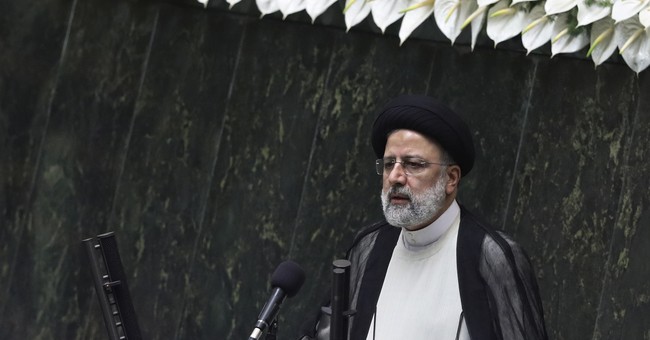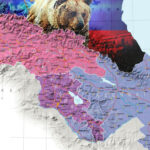The religious extremists controlling Tehran try to connect themselves to their subjects’ ancestors, while doing everything possible to destroy any chance of a new age of enlightenment and prosperity.
Not satisfied with just destroying the country they control, the fundamentalists have expanded their reign of terror throughout Iraq, Syria, and Lebanon. As the number-one nation-state exporter of international terrorism, Iran has empowered its Islamic Revolutionary Guards Corps (IRGC), Ministry of Intelligence and Security (MOIS), and Quds Force to commit terrorist acts around the globe.
Having sown instability in the Middle East, Iran has been pushing itself north into the Caucasus region which serves as a land bridge connecting Iran to Eastern Europe. Just as Iran meddled in Yemen’s civil war, it also meddled in supporting Armenia’s hostile and illegal land grab on Azerbaijan’s Nagorno-Karabakh region. Within the past year, with critical assistance from Turkey, Azerbaijan regained invaded territory. Finally, Armenia and Azerbaijan appear to be working toward diplomatic solutions to their differences.
Loss of a proxy war and the two adversaries looking to future cooperation has not settled well for Iran.
Azerbaijan’s victory in Karabakh eliminates Iran’s free access route for fuel and weapons shipments to Armenia. Cargos are now subject to Azerbaijan road taxes and inspections. An already murky cocktail of religion, social and traditional media, and narrow-focused trade interests is further complicated by the fact that Iran has its own very large ethnic Azeri population of some 15 million, roughly double that of the entire population of Azerbaijan itself. This ethnic minority, which shares the same Turkic language as their cousins in Azerbaijan, has always been viewed warily by the authorities in Teheran.
The Iranian government was badly rattled by the Green Movement protests of 2009 and the domestic protests of 2011-12 which echoed the Arab Spring. The epicenter of these protests was the ethnic Azeri areas in the north of Iran. In seeking to destabilize Azerbaijan, Iran’s leaders are also issuing a barely-veiled threat to a substantial number of its own citizens.
The problem gets even worse for Tehran. In addition to reaching out to Turkey, Azerbaijan has commenced working with Israel. Iran knows if its military ever goes up against Israel, it will get crushed on the ground, in the air, and in cyberspace. Likewise, Iran is fearful of Azerbaijani troops being trained by the Israeli military. Israel always wins by superior weaponry, well-trained forces, and combat intellect. Lacking depth in all three of these capabilities, the IRGC relies on brutality and terrorist attacks to achieve its goals.
That is exactly what the IRGC has trained Hezbollah forces to do in Syria and Lebanon. Now inside Iranian camps, the IRGC is training young Azeris, who are already susceptible to extremist ideas, to become another Hezbollah. In total hypocrisy, while falling back on its never-ending anti-Zionist rhetoric, Iran claims it will “not tolerate Zionist-terrorists” across its northern border.
Meanwhile, it is not surprising that Iran has mobilized its troll army to destabilize public opinion in Azerbaijan. Normalized diplomatic, trade, and security ties between Azerbaijan and Israel further allow Iran to play the anti-Zionist card. Hundreds of social media channels fan the flames, while Iran’s government has added fuel to the fire with saber-rattling military maneuvers close to the country’s border with Azerbaijan.
Iran actively uses radio frequencies in southern Azerbaijan to drown out national radio stations and broadcast exclusively Iranian propaganda. Currently, more than 10 Iranian radio channels are actively working in the south of Azerbaijan in Talysh, Persian, and Azeri areas. Iran has deployed its most powerful radio transmitters to jam Azerbaijani stations. Pro-Iranian preachers accuse Azerbaijan of betraying Shiite values and deviating from the foundations that Ayatollah Khamenei defines.
Meanwhile, Iran opposes the opening of the Zangezur corridor through Armenia, which will connect China, the countries of Central Asia, and Azerbaijan with Europe through Turkey. Tehran believes it could be sidelined. Iran stands to benefit from offering a hand of friendship to Azerbaijan at a point that would allow it to participate in these revived trade routes; yet it persists in the politics not of strength but of fear.
Focusing on what it thinks it might lose through the prospect of lasting peace and stability between its northern neighbors, Iran appears blind to what it could gain. A crucial final link in the hugely significant north-south trade corridor which can link Mumbai to Moscow is a short stretch of railway linking Iran to Azerbaijan, a project fully agreed to in principle but frozen on the ground by Iran’s ruling fundamentalists.
This is a highly sensitive part of the world, and the international community should condemn Iranian meddling. Iran’s desperate maneuvers bear the hallmark of a country which believes it is running out of options. If it is genuine about breaking its isolation, Iran must learn that terrorizing its own people and destabilizing the region will not succeed. Baku, the cosmopolitan Azerbaijani capital, is not suddenly about to accept a reign of fundamentalist oppression imported from the south.
The only way for Iran to escape its current predicament is to stop playing poisonous games in its backyard and cooperate with the international community, starting by renouncing all aspects of its military nuclear program. Iran could take a lesson from its northern neighbors. Despite decades of open hostility, the prospect of a lasting peace seems to be gathering momentum. In recent weeks the leaders of both Armenia and Azerbaijan have moderated their rhetoric and expressed a willingness to meet. The Organization for Security and Co-operation in Europe’s Minsk Group, charged with resolving the two countries’ disputes, appears to have new energy. There is a path to peace; but, as always, Iran isn’t on that path. Its actions point in another, more sinister, direction. It’s time for Tehran to change course.
Wes Martin
Townhall.com










